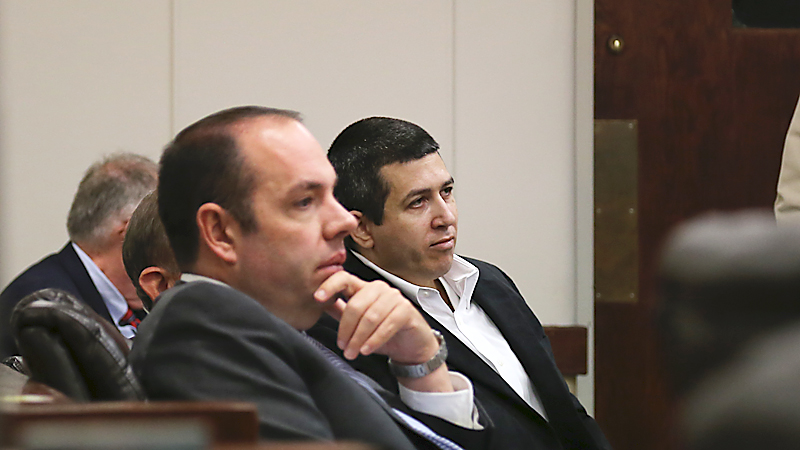Azotea pleads guilty in murder case, sentenced to life without parole
Published 11:07 am Wednesday, February 7, 2018

- Star Photo/Abby Morris-Frye Eric Azotea, right, entered a guilty plea to two counts of first degree murder on Wednesday morning.
A Carter County man received a sentence of life without the possibility of parole after pleading guilty to two counts of first-degree murder on Wednesday morning bringing the trial against him to an end.
Eric Azotea, 46, formerly of the Pinecrest community, had been on trial in connection with the January 2015 deaths of Arthur Gibson and Amber Terrell.
Trending
On Wednesday morning, outside the presence of the jury, Azotea entered a guilty plea to two counts of first-degree murder and was sentenced to life in prison without the possibility of parole. At the start of the trial, Azotea entered a guilty plea to charges of tampering with evidence and two counts of abuse of a corpse.
A jury in the case was seated on Monday afternoon, and testimony in the trial began on Tuesday. However, a statement by a witness in the case brought the proceedings to a screeching halt on Tuesday afternoon.
The State called Jeremy Combs to the stand and asked him how he knew Azotea. Combs responded that he had done some work for Azotea’s in-laws and that Azotea had just gotten out of prison.
One of Azotea’s defense attorneys, Gene Scott, quickly stood up and called an objection to the testimony, and Assistant District Attorney General Dennis Brooks held up his hand to direct Combs to stop talking. Criminal Court Judge Stacy Street sent the jury out of the room in order to handle the objection.
Under the rules of law, jurors are not allowed to hear testimony about a defendant’s prior criminal record because of the potentially prejudicial affect it may have on their deliberations.
The statement could have led to either the defense or the prosecution requesting the court to declare a mistrial in the case, but Street said on Wednesday that neither side had made that motion.
Trending
Street sent the jury home for the day on Tuesday to allow time for the attorneys for both sides to discuss how to handle the issue of the inadmissible statement.
“I was told there were discussions ongoing about a possible plea in this case,” Street said on Wednesday, adding shortly after 5 p.m. he received a telephone call from Scott informing him an agreement had been reached.
On Wednesday morning, Scott informed the court a plea agreement had been negotiated and that his client wished to accept the agreement and enter a guilty plea. Scott said he and Azotea’s two other attorneys — Dan Smith and Lesley Tiller — had discussed the matter at length with their client as well as with his mother.
In court on Wednesday morning, District Attorney General Tony Clark said he and Brooks had met with family members of both Gibson and Terrell to discuss the issue of the inadmissible testimony with them as well as the possibility of a plea agreement.
“I spoke with them and told them what was going on and let them speak amongst themselves,” Clark said. “We think this is best for all parties involved.”
After accepting Azotea’s plea on the murder charges, Street also sentenced him on the charges of tampering with evidence and two counts of abuse of a corpse which he entered a guilty plea to on Tuesday. Those sentences will run concurrently with the life sentence Azotea will serve in the murders.
Following the acceptance of the plea, Street brought the jury into the courtroom to speak with them because he said he felt they were owed an explanation of what happened and why.
Once the jury was in the courtroom, Street explained to them the issue created by the witness’s statement.
“Despite our best efforts, someone said something you weren’t supposed to hear,” Street told the jury. He then went on to explain why a defendant’s prior criminal history is inadmissible to a jury.
Street then went on to detail the plea agreement which had been reached in the case and the sentence.
“Mr. Gibson’s and Ms. Terrell’s family, I hope, can move on to the next chapter of their lives and not worry about seeing the photographs and hearing the testimony they would have had to endure,” Street said. “Mr. Azotea will now spend the rest of his life in the penitentiary. His family, the solace they will take is that he will not be put to death for the crimes that he committed.”





